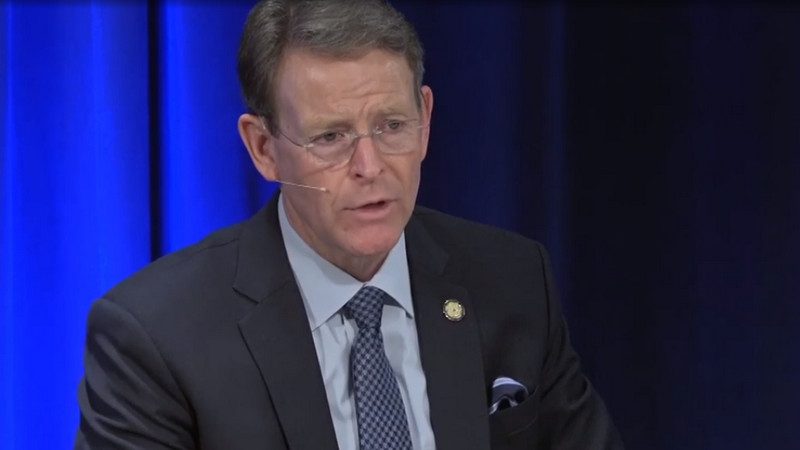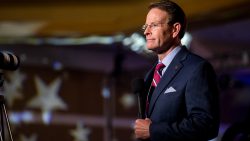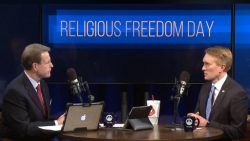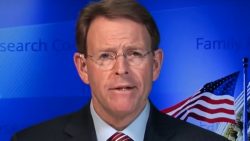Sen. Lindsey Graham was scheduled to talk about religious liberty at the Family Research Council’s Washington, D.C. headquarters on Tuesday afternoon, but he was a no-show. While some attendees munched on their Chick-fil-A box lunches, Perkins announced that Graham would be delayed, and eventually that the senator was tied up with official business and wasn’t going to make it. (Turns out Graham was busy pushing more awful Trump judges onto the federal courts.)
In Graham’s absence, Perkins talked with Gayle Manchin, wife of the West Virginia senator and a colleague of Perkins’ on the U.S. Commission on International Religious Freedom (USCIRF), and Travis Weber, who heads FRC’s Center for Religious Liberty.
The USCIRF, a bipartisan group chartered by Congress, just released its annual report, which identifies countries that most egregiously violate religious liberty and carry out, or tolerate, the persecution of religious minorities. USCIRF included 16 countries in its Tier 1 (the worst) and another dozen in Tier 2. The commission also identifies and advocates on behalf of people it identifies as prisoners of conscience.
Weber spoke about a new report by FRC’s Center for Religious Liberty on apostasy, blasphemy and anti-conversion laws, and the ways that such laws are used to restrict individuals’ freedom to choose, change, and live according to their faith.
As Right Wing Watch has reported, many of the most religiously repressive countries identified by USCIRF are the same countries that U.S. Religious Right groups work with closely to resist international recognition of LGBTQ human rights in favor of nations’ ability to enforce their “traditional” views on family, sex, and gender—including Saudi Arabia and Russia.
Asked what Russia did to earn its Tier 1 position, Perkins cited the country’s clampdown on Jehovah’s Witnesses (which is extremely harsh and ongoing) and other religious minorities. Of course, many U.S. Religious Right leaders have enthusiastically embraced Russia’s strongman President Vladimir Putin for his anti-gay policies, praising him as a protector of Christian civilization against the decadent secular West.
Perkins urged pastors and churches to adopt prisoners of conscience and pray for religious freedom for “every man, woman and child on the face of the planet.” It’s good to hear Perkins affirming that religious freedom is for everyone, because he and his FRC colleague Jerry Boykin have a decidedly mixed record at best when it comes to defending the First Amendment rights of American Muslims.
While some countries, like Russia and China, are moving in the wrong direction on religious liberty, Perkins said, some Middle Eastern countries are trying to do better, which Perkins credited to the efforts of the Trump administration. Last year, though, a group of former diplomats warned that the rise of anti-Muslim and nativist rhetoric in the U.S. was threatening the ability of the U.S. to advocate effectively for human rights and religious minorities overseas.
Perkins made a connection between the very real and often deadly persecution faced by Christians in many parts of the world and what the Religious Right portrays as “persecution” of Christians in the U.S. He warned that Americans have become “soft” and “complacent” toward First Amendment freedoms:
I think we need to encourage our churches and others to focus on this issue of international religious persecution, because this is what happens when you don’t have a vibrant First Amendment. This is what happens when you don’t defend that right and uphold it. This—what is happening in some of these places like China, like Russia, Burma, other places—could be happening here if we lose the First Amendment and those who stand up day in and day out and defend it.









